- Author Arianna Cook [email protected].
- Public 2024-01-12 17:55.
- Last modified 2025-01-23 09:40.
Find out if and how much water to drink after the gym. During classes in the hall, I really want to drink, and the reason for this is quite understandable. However, you can find various recommendations on when and how much it costs to drink water. Today we will try to tell you in detail why you should not drink water after training.
What processes take place in the body during fluid loss?
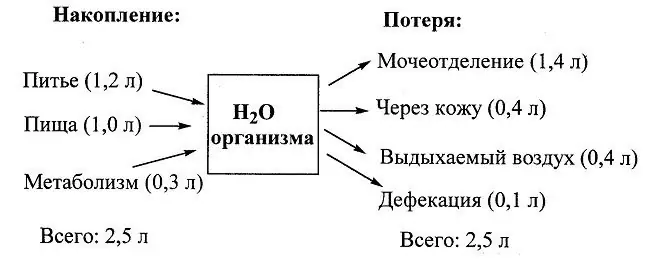
To get an answer to the main question of this article - why you can't drink water after training, you first need to understand the processes that take place in the body during fluid loss.
Under the influence of physical exertion, the body loses a large amount of fluid. When a person exercises, the body temperature rises and the process of sweating is activated. Its main task is to protect the body from overheating. However, it should be noted that sweat is released not only during training. We often do not notice, but even at room temperature during the day, along with sweat, the body loses about 0.5 liters of fluid.
Sweating not only protects us from overheating, but is also designed to remove excess salts and metabolic metabolites. The fact that toxins leave the body along with sweat is beneficial, but the loss of salts that act as electrolytes can be dangerous.
When a person sweats a lot, the body becomes dehydrated, and thirst is the first symptom of the onset of this process. When about two percent of the total body weight is excreted from the body, you can observe clear signs of the onset of dehydration.
If you make up for these losses in a short time, then the body's performance will not change. But if you do not restore the balance of electrolytes, then the amount of blood circulating through the vessels decreases, and the kidneys begin to synthesize a substance - rhinin. It helps to constrict blood vessels, which leads to an increase in blood pressure.
This is a kind of signal for the body to start saving water. As a result, fluid is drained from tissues and small vessels and directed to the main organs: the brain, heart, kidneys and lungs.
Even if you train at the highest possible intensity for you, dehydration in this situation is not critical and will not negatively affect your health. However, performance will definitely be reduced, which will lead to a drop in the effectiveness of your activity. For example, if you are training with the aim of losing weight, then due to a decrease in efficiency, you can complete the lesson before the moment the body starts burning fat.
The main symptoms of dehydration after exercise
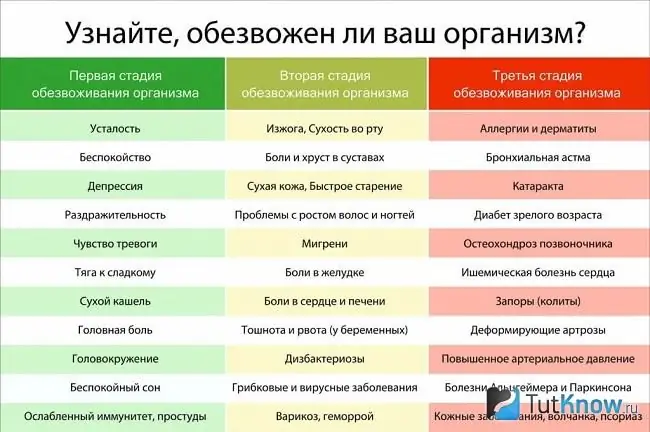
Dehydration of the body is always accompanied by some symptoms, which can be divided into two groups: early and dangerous. Early symptoms of onset dehydration include inability to tolerate heat, increased fatigue, headache, dry mouth, decreased appetite, reddening of the skin, and dry cough.
Among the dangerous signs, we note the following: blurred eyes, delirium, muscle spasms, numbness of the skin, difficulty swallowing, stumbling in conversation, awkward behavior. If you use water incorrectly and this applies to high-intensity activities, then it can harm the body. It certainly sounds incredible and it is difficult to imagine that ordinary water can be dangerous to the body. However, in practice, this is quite possible due to the onset of overhydration or, more simply, poisoning of the body with fluid that was consumed in excessive quantities.
What is overhydration?
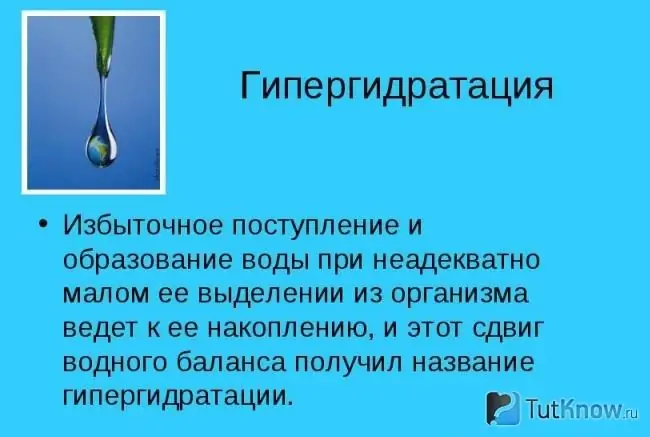
If a person immediately consumes a large amount of water, then the blood is diluted, and salts are quickly washed out of the body, which play the role of electrolytes. Electrolyte imbalance is just as dangerous to your health as dehydration. First of all, this is due to a decrease in the contractile abilities of all the muscles of the body, including the heart.
Most of the symptoms of onset overhydration are similar to those of dehydration. A person begins to experience pain in the head, consciousness is confused, dizziness appears and irritability increases. After this, the second stage of overhydration begins, when breathing becomes difficult, nausea and weakness in the muscles appear. Athletes need to avoid even mild overhydration, as the consequences can be dire. Here we come to an explanation of why you should not drink water after training and how to do it correctly.
How to drink water properly during training?
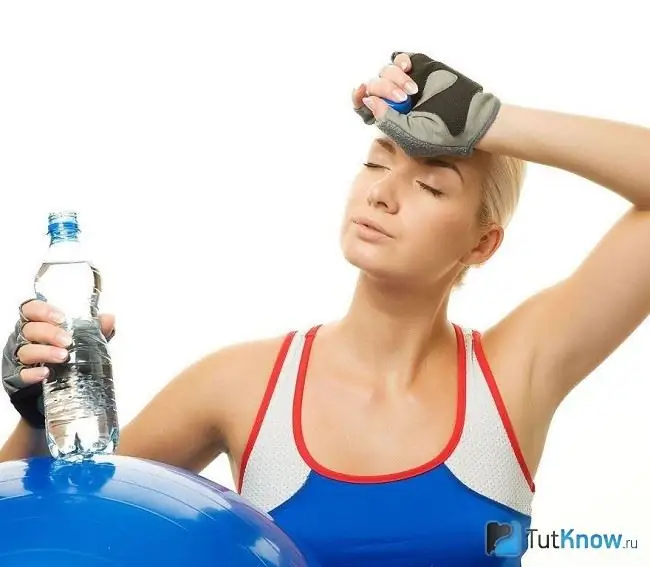
During the lesson, you must definitely drink water, although often the trainer or physical education teacher will not allow you to do this. There are several explanations for this fact. First of all, this applies to sports games, when you can only quench your thirst during a pause. Also, some coaches are sure that in this way you can temper the character of your ward.
In addition, it can be quite difficult to control the amount of fluid you drink, and we have already talked about the possible consequences of overhydration. Also, the trainer may prohibit drinking water during the lesson for certain reasons. For example, in gymnastics it is extremely important to have lean muscles, which is impossible if you drink water.
Professional dancers and gymnasts believe that if the lesson lasts no more than an hour and a half, then you should not drink. When the duration of the training is about three hours, then you can gradually drink a glass of liquid. If the workout lasts five hours, then during this time it is worth consuming no more than 0.5 liters of water.
If you follow sports, you probably noticed that professional athletes try to drink as little water as possible. This is due to the fact that the liquid interferes with training, as the person feels extra heaviness. That is why athletes often only rinse the oral cavity, and restore the water balance after the completion of the training.
If an athlete is preparing for an important tournament, then he needs to get rid of excess fluid. This is especially true in bodybuilding, because the athlete must approach the tournament with a minimum content of fat and fluid in the body. Keep in mind, however, that you need to drink water during normal workouts. We already understood why you shouldn't drink water after training, but now let's find out how to do it correctly. It is quite obvious that you can only drink plain water during training. In winter, the water temperature should be close to room temperature, and in summer it can be slightly cooled.
If you are doing a long workout in hot conditions, then you should use mineral water. It will help you replenish your electrolyte balance. If you are doing exercises that require high energy expenditure, such as deadlifts, then you can dissolve a small amount of honey in the water.
Today in sports food stores you can find a special type of supplement - isotonic. They are designed specifically for this purpose. Isotonic contains water, salts, micronutrients, carnitine and amines. Very often, novice athletes are interested not only in why they should not drink water after training, but also how much they can drink during exercise.
It is quite difficult to give an exact answer here, since there are no restrictions on the amount of fluid consumed in the absence of health problems. In many ways, the answer to this question depends on the workout itself that you are doing. For example, in sports games, you will only be able to drink while paused. If you do long runs, then every 15 minutes you should drink about 0.2 liters of water.
When doing bodybuilding, drink a couple of sips between movements. You should also reiterate why you shouldn't drink water after exercise. More precisely, you can drink until your thirst is completely quenched, but do it slowly, using small sips.
Here are some tips on how to drink water properly in class:
- You cannot drink a lot, as swelling of the body may appear and the work of the genitourinary system may be disrupted.
- If there is a lot of fluid in the body, then the excess will be utilized.
- Do not expect to be very thirsty during the session.
- During the day, you need to drink at least one and a half liters of water, even if you do not play sports.
- Every morning, right after waking up, it is worth drinking a glass of water.
- Do not drink heavily chilled water during your workout to avoid getting sick.
Myths about why you shouldn't drink water after exercise
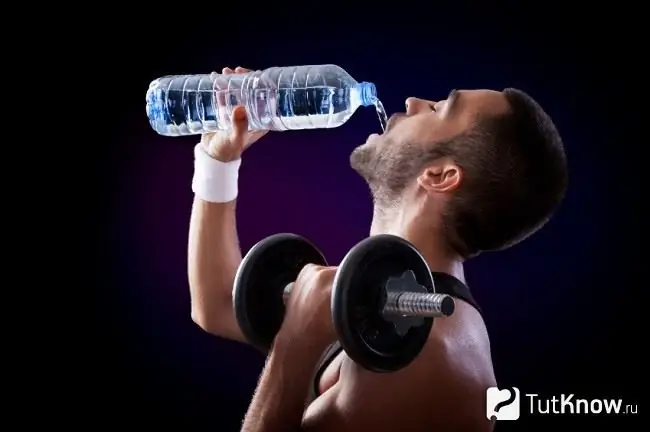
If you study the textbooks of fitness trainers, then you can find recommendations in them that you should not allow the athlete to dehydrate. However, we have already said that some coaches still do not allow their wards to drink water. This myth was born during the Soviet Union, when a group of scientists was creating shaping. This was to be the USSR's response to bourgeois fitness.
Simultaneously with the rules of the training, a dietary program for shaping was created. In the original version of the nutrition rules, it was noted that after the end of the lesson, you should not drink water for 40 minutes. This time was gradually increased to 120 minutes. At the same time, there were no serious arguments for the introduction of this ban. According to scientists, lipolysis processes are more active, with a low fluid content in the body.
However, it is now known for sure that water is also needed for fat burning processes. If you allow dehydration of your body during training, then this does not contribute to the acceleration of lipolysis, but on the contrary. If the water balance in the body is not restored, then cortisol begins to be actively synthesized. At a certain concentration of this hormone, appetite increases, which does not contribute to weight loss at all. During times of severe stress, and dehydration is, the body will not part with its energy reserves.
To drink or not drink water during and after training, you will learn from the following video:






